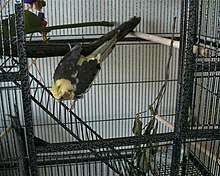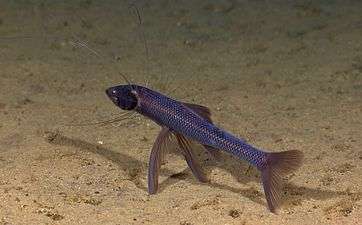Tripedalism
Tripedalism (from the Latin tri = three + ped = foot) is locomotion by the use of three legs. It has been conjectured that parrots (Psittaciformes) display tripedalism during climbing gaits,[1] though this has not yet been documented thoroughly in scientific literature. Tripedal gaits were also observed by K. Hunt[2] in primates. This is usually observed when the animal is using one limb to grasp a carried object and is thus a non-standard gait. Apart from the parrot conjecture, there are no known species where three legs are standard, although the movement of some macropods such as kangaroos, which can alternate between resting their weight on their muscular tails and their two hind legs and hop on all three, may be an example of tripedal locomotion in animals. There are also the tripod fish. Several species of these fish rest on the ocean bottom on two rays from its two pelvic fins and one ray from its caudal fin.[3]


Tripedalism contrasts with the common bipedalism of two-legged animals and quadrupedalism of four-legged animals.
Quadrupedal amputees and mutations
There are some three-legged creatures in the world today, namely four-legged animals (such as pet dogs and cats) who have had one limb amputated. With proper medical treatment most of these injured animals can go on to live fairly normal lives, despite being artificially tripedal. There are also cases of mutations or birth abnormalities in animals (including humans) which have resulted in three legs.
Mythological and fictional tripedals
- Money frog
- Three-legged bird[4]
- Species 8472, a fictional race in the television series Star Trek: Voyager
- The armored fighting machines in H. G. Wells's novel The War of the Worlds and its radio and film adaptations
- Xorn, from the role-playing game Dungeons & Dragons
See also
References
- A Comparative Survey of Climbing Robots and Arboreal Animals in Scaling Complex Environments, C. Webster, 2017
- Hunt, Kevin D.; Cant, John G. H.; Gebo, Daniel L.; Rose, Michael D.; Walker, Suzanne E.; Youlatos, Dionisios (1996). "Standardized descriptions of primate locomotor and postural modes". Primates. 37 (4): 363–387. doi:10.1007/BF02381373.
- oceancontent (6 February 2009). "Tripod Fish". Retrieved 29 September 2016 – via YouTube.
- Illustrated research essay Three-Legged Animals in Mythology and Folklore